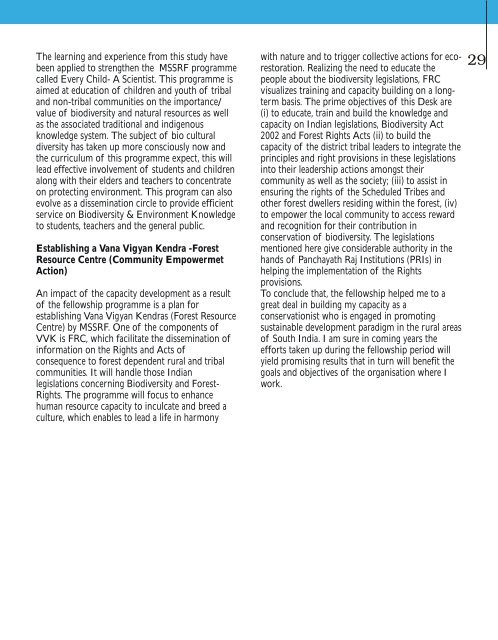Images - IUCN
Images - IUCN
Images - IUCN
You also want an ePaper? Increase the reach of your titles
YUMPU automatically turns print PDFs into web optimized ePapers that Google loves.
The learning and experience from this study have<br />
been applied to strengthen the MSSRF programme<br />
called Every Child- A Scientist. This programme is<br />
aimed at education of children and youth of tribal<br />
and non-tribal communities on the importance/<br />
value of biodiversity and natural resources as well<br />
as the associated traditional and indigenous<br />
knowledge system. The subject of bio cultural<br />
diversity has taken up more consciously now and<br />
the curriculum of this programme expect, this will<br />
lead effective involvement of students and children<br />
along with their elders and teachers to concentrate<br />
on protecting environment. This program can also<br />
evolve as a dissemination circle to provide efficient<br />
service on Biodiversity & Environment Knowledge<br />
to students, teachers and the general public.<br />
Establishing a Vana Vigyan Kendra -Forest<br />
Resource Centre (Community Empowermet<br />
Action)<br />
An impact of the capacity development as a result<br />
of the fellowship programme is a plan for<br />
establishing Vana Vigyan Kendras (Forest Resource<br />
Centre) by MSSRF. One of the components of<br />
VVK is FRC, which facilitate the dissemination of<br />
information on the Rights and Acts of<br />
consequence to forest dependent rural and tribal<br />
communities. It will handle those Indian<br />
legislations concerning Biodiversity and Forest-<br />
Rights. The programme will focus to enhance<br />
human resource capacity to inculcate and breed a<br />
culture, which enables to lead a life in harmony<br />
with nature and to trigger collective actions for ecorestoration.<br />
Realizing the need to educate the<br />
people about the biodiversity legislations, FRC<br />
visualizes training and capacity building on a longterm<br />
basis. The prime objectives of this Desk are<br />
(i) to educate, train and build the knowledge and<br />
capacity on Indian legislations, Biodiversity Act<br />
2002 and Forest Rights Acts (ii) to build the<br />
capacity of the district tribal leaders to integrate the<br />
principles and right provisions in these legislations<br />
into their leadership actions amongst their<br />
community as well as the society; (iii) to assist in<br />
ensuring the rights of the Scheduled Tribes and<br />
other forest dwellers residing within the forest, (iv)<br />
to empower the local community to access reward<br />
and recognition for their contribution in<br />
conservation of biodiversity. The legislations<br />
mentioned here give considerable authority in the<br />
hands of Panchayath Raj Institutions (PRIs) in<br />
helping the implementation of the Rights<br />
provisions.<br />
To conclude that, the fellowship helped me to a<br />
great deal in building my capacity as a<br />
conservationist who is engaged in promoting<br />
sustainable development paradigm in the rural areas<br />
of South India. I am sure in coming years the<br />
efforts taken up during the fellowship period will<br />
yield promising results that in turn will benefit the<br />
goals and objectives of the organisation where I<br />
work.<br />
29

















